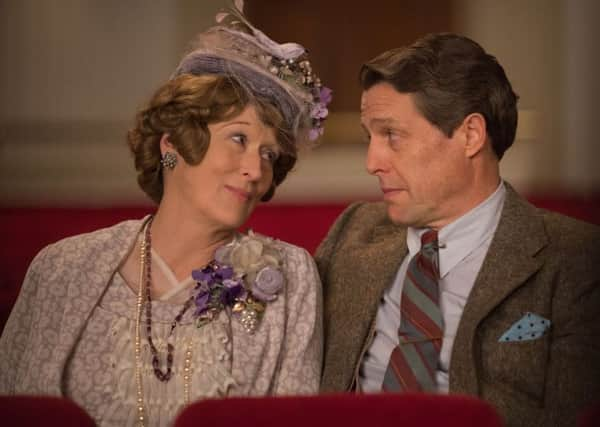How Meryl Streep lured Hugh Grant back to the big screen


For all intents and purposes Hugh Grant had given up on showbusiness.
Instead his focus was on the hacking scandal that saw him giving evidence to a parliamentary inquiry alongside other celebrities and the family of murdered teenager Milly Dowler.
Advertisement
Hide AdAdvertisement
Hide AdBut Stephen Frears brought him back. And he did it with three temptations: the story of a woman who couldn’t sing, the participation of Meryl Streep and a plum part for Grant as a middling actor in 1940s America.


“It was a very good part for me, actually,” said 55-year-old Grant. “I could see it was fascinating and complicated so I felt I had to get off my arse and do it. St Clair Bayfield was English, an illegitimate heir to the aristocracy in New York [and] a failed actor in the 30s.
“He really was going nowhere until he met this curious woman who was a millionairess and thought she could sing, and couldn’t. Together they ran these musical societies in New York and attracted all high society. This was his little world and something he had to cling to because he had nothing else. So in this film you see him being very supportive of her. You’re never really sure: is this real love or because he’s got nothing else?”
The unlikely double act that Grant refers to was Florence Foster Jenkins, an amateur soprano so bad that she commanded significant radio audiences, and Bayfield, a younger man who devoted himself to her whims.
Advertisement
Hide AdAdvertisement
Hide AdStephen Frears’ film chronicles Florence’s final months when she makes recordings that receive airtime on the wireless. It spurs her on to sing at Carnegie Hall – and to surrender to the full power of professional critics, something she had always previously avoided.


“I’ve always loved Stephen’s films. He’s been saying to me for years, ‘We should do a film’ and I’ve always said, ‘I don’t think so, Stephen. I think I’ve put showbusiness behind me’. I didn’t really want to do any more acting at all. Then this script was just so interesting and funny that I felt I had to. I couldn’t say no. Meryl is a trained, proper classical singer. And it took that ability to be able to be bad in a humorous way. It’s a very difficult thing to do, that thing she does – to sing badly, that hilariously.”
Streep has sung in movies as diverse as Mamma Mia!, A Prairie Home Companion and Into the Woods. Yet playing opera wannabe Florence meant adding something completely new to her impressive bag of tricks.
“I tried to sing as well as she does,” says the 66-year-old triple Oscar winner. “What’s wonderful about her was how close she came to being good. When it went off, that’s when it became glorious and funny. But it was the attempt and yearning for it to be good that is the part that’s so joyous for me. It was fun to do.”
Advertisement
Hide AdAdvertisement
Hide AdBut the film is more than just a shallow and simplistic take on a bad singer. Instead it looks beyond Florence’s wide-eyed love of music – co-star Simon Helberg refers to Florence as being “filled with passion and unburdened by talent” – to her neediness and her delusional obsessions.
Florence was also syphilitic – a souvenir of a brief marriage many years before. To cope with the disease’s effects she took a toxic cocktail of remedies that included mercury and an arsenic-based compound.
Adds Streep: “The film is very smart [but] it may not bear resemblance to what her actual life was. It leaves questions of whether the sound was a combination of mercury and arsenic that she took, and whether that impeded her brain function.
“Whether or not she was impeded by those things, I don’t know. Our story is more metaphoric in a way. It’s about the illusions we maintain for each other, how we keep each other happy, and what function love serves.
Advertisement
Hide AdAdvertisement
Hide Ad“With the love of her husband she was able to believe that she really was a singer. She was a true amateur. She did what she did for the pure love of it. And that’s sort of what’s beautiful about her.”
Helberg as pianist Cosme McMoon is Florence’s on-stage counterpart. Out of his element and terrified, he witnesses the true nature of Florence’s desperate drive to be heard.
“She heard a voice in her head and the audience heard a different voice,” he observes. “Her intention was different from what the result brought. Ultimately it didn’t matter. People laughing at her… they didn’t come to support her because they wanted to make fun of her. They got joy out of it. And that’s very freeing.”
There is already talk that Streep, with her unerring ability to choose memorable roles, will receive yet another Academy Award nomination: her 20th since The Deer Hunter in 1979.
Advertisement
Hide AdAdvertisement
Hide AdIf Oscar comes calling it will perhaps offer some vindication for Florence Foster Jenkins, a woman pilloried and mocked during her lifetime and who, in death, continues to sell recordings that capture the uniqueness of her sound.
Streep confesses that trying to sing badly – and act as if Florence was attempting to be as good as she could manage – was at the core of her performance.
“I had to strive to come up to what she could sing. She’d go off in the weirdest places and it was the particularity of her getting things wrong that was so funny. The recordings were so funny. You could hear her [gasping] getting ready to sing something and she spends all of her voice on the beginning and there’s nothing left at the end. The attempt is all, you know?”
Florence Foster Jenkins (PG) is out in cinemas today.